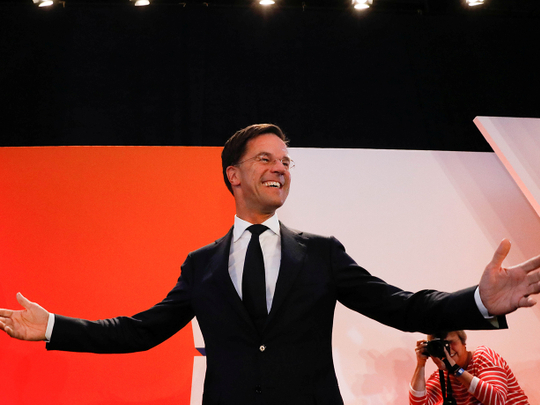
The Hague: Dutch Prime Minister Mark Rutte appeared Wednesday to have easily defeated a strong challenge by far-right rival Geert Wilders in a key election seen as a bellwether of populist support in Europe.
According to exit polls, Rutte’s Liberal VVD party was set to scoop 31 seats, making it the largest in the new 150-seat parliament, with Wilders and his Freedom Party (PVV) beaten into second place alongside two others on 19 seats.
Millions of Dutch had flocked to the polls in a near-record turnout, with the stakes high in an election pitting the pro-European Rutte against his anti-immigration and anti-EU rival.
Following last year’s shock Brexit referendum and Donald Trump’s victory in the US, the Dutch vote was being closely scrutinised as a gauge of the rise of populism on the continent ahead of crucial elections in France and Germany.
“This was the evening when The Netherlands, after Brexit and the American elections, said ‘stop’ to the wrong kind of populism,” Rutte told cheering supporters.
“Now of course it’s important to unite the country in the coming weeks and months and that we succeed in forming a stable government for the next four years,” he added.
Relieved European leaders, fearing the rise of anti-EU sentiment in one of the bloc’s founding members, congratulated Rutte.
A spokesman for EU Commission chief Jean-Claude Juncker hailed it as a “vote against extremists” while one senior European source told AFP on condition of anonymity: “Common sense strikes back.”
Foreign Minister Jean-Marc Ayrault of France, where the far-right Marine Le Pen is currently seen winning the first round of the presidential election in April, congratulated Rutte for “stopping the rise of the far-right.”
‘Not rid of me yet’
Wilders had pledged to close the borders to Muslim immigrants, shut mosques, ban sales of the Quran and leave the EU if he won the polls.
He thanked his supporters in a message on Twitter, with his party looking likely to boost its number of MPs to 19 from 12 in the outgoing parliament.
“We won seats. The first gains are made. And Rutte is not rid of me yet,” he said.
On a warm Spring day, queues began early at polling stations and turnout reached 81 per cent, just shy of the record of 88 percent set in 1977.
One Muslim voter told AFP she was afraid of Wilders’ fiery anti-Islam rhetoric.
“If you have one person who criticises, it’s OK. But every time another person comes and then another one... then it’s really hard to defend yourself,” student Khadiga Kallouh, 22 said.
Rutte appeared to have benefited from his firm stance in a spiralling diplomatic spat with Turkey after authorities barred Turkish ministers from rallying support in the Netherlands for a referendum.
‘Populism doesn’t pay’
Assuming the exit polls reflect the final result, Rutte will get the first chance to form the next coalition and could possibly turn to the Christian Democratic Appeal (CDA) and the Democracy party D66, which both matched Wilders with a predicted 19 seats.
But with the three parties’ combined total of 69 seats, he would need another party to reach the 76-seat majority.
Coalition talks to put a new government in place are expected to be tough and the process could take months.
Rutte, who had 40 seats in the outgoing parliament, has vowed never again to work with Wilders, turned off by his incendiary message, and after the PVV caused an earlier coalition to collapse.
The “PVV is not such a revolutionary, Trumpian force,” Leiden University expert Geerten Waling told AFP.
“People stick to responsible politicians mostly,” he said, acknowledging though that the PVV’s showing was “not small”.
The analyst also pointed to the “disastrous” showing of the traditional Labour party, Rutte’s sole partner in the outgoing coalition.
Support for the party appears to have evaporated and it was predicted to lost 29 seats to hold on to just nine.
Labour leader Lodewijk Asscher told supporters late Wednesday “the voters have spoken, difficult as it is, but that is democracy.”
One of the biggest winners of the day was the young, charismatic Jesse Klaver, leader of the ecologist leftwing GroenLinks.
In a remarkable turnaround, the party is likely to win 16 seats compared to just four in the outgoing parliament.
Trumpeting the country’s economic growth and stability, Rutte is bidding for a third term as premier of the country - one of the eurozone’s top economies and a founding EU member.












